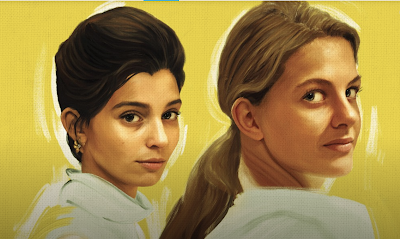My Brilliant Friend – first edition of the English translation, 2012, by Europa Editions
“Elena Ferrante may be the best contemporary novelist you have never heard of,” said The Economist in a review one year after Europa Editions brought out the English translation of L‘amica geniale as My Brilliant Friend. In the years following 2012 three other novels were published that follow the two friends as they grow up – The Story of a New Name (2013), Those Who Leave and Those Who Stay (2014), and The Story of the Lost Child (2015). The four novels constitute the Neapolitan Novels quartet by Elena Ferrante. The first two books in the series have been adapted into an HBO television series entitled My Brilliant Friend.
The HBO Series starring Gaia Girace as Lila and Margarita Mazzuco as Lenù
Elena Ferrante, the author, has maintained a studied anonymity, although she is willing to answer questions by e-mail, via her publisher. Her translator into English, Ann Goldstein, an editor at The New Yorker, did not have access to her directly; the film directors who transferred her novels to the screen had only the most fleeting help from her. Her attitude is summed up in a comment she made: “I believe that books, once they are written, have no need of their authors.”
A collection of essays, letters and interviews by Elena Ferrante
For Ferrante’s heroines, life is a conundrum of attachment and detachment. Illustration by Annette Marnat in The New Yorker








